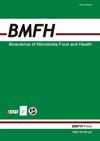日本女性30岁时肠道微生物组组成的异质性:来自比较分析的见解
IF 2.9
4区 医学
Q2 Agricultural and Biological Sciences
引用次数: 0
摘要
与性别相关的肠道微生物群差异的原因尚未确定,尽管性激素、饮食和其他因素被认为是造成这些差异的原因,但其中许多因素与年龄有关。为了阐明这种复杂的相互作用,我们的研究旨在调查和比较不同年龄范围内男性和女性的肠道微生物组成,旨在确定性别相关的差异和潜在的因果因素。我们的研究包括对来自日本DNA数据库的444名日本人的肠道微生物群数据进行全面分析,这些人从新生儿到百岁老人不等。我们将受试者分为13个不同的年龄组,并检查了他们的相对微生物丰度,以及与性别和年龄相关的α和β多样性。在任何年龄的男性和女性之间,肠道菌群的相对丰度或α多样性都没有观察到差异。然而,研究表明,20多岁的女性肠道微生物群的异质性比男性更大。为了证实这种差异的普遍存在,我们使用七个数据集进行了额外的分析:三个来自日本,四个来自其他国家。有趣的是,这种差异在日本女性中尤为明显。我们还显示了观察到的异质性和膳食纤维摄入量之间的潜在联系。希望这项研究能够提供线索,帮助确定导致肠道微生物群组成性别相关差异的因素。本文章由计算机程序翻译,如有差异,请以英文原文为准。
Heterogeneity of gut microbiome compositions in the third decade of life in Japanese women: insights from a comparative analysis
The reasons for sex-associated gut microbiota differences have not been determined, and although sex hormones, diet, and other factors are considered to contribute to them, many of these factors are age related. To shed light on this complex interplay, our study aimed to investigate and compare the gut microbial compositions of males and females across a broad range of ages, aiming to identify sex-associated disparities and potential causal factors. Our study encompassed a comprehensive analysis of gut microbiota data obtained from 444 Japanese individuals, ranging from newborns to centenarians, sourced from the DNA Data Bank of Japan. We categorized the subjects into 13 distinct age groups and examined their relative microbial abundances, as well as alpha and beta diversities, in relation to sex and age. No difference was observed between gut microbiota relative abundances or alpha diversities between men and women at any age. However, the study showed that the heterogeneity of gut microbiota among women in their 20s was greater than in men. To confirm the general occurrence of this difference, we conducted additional analyses using seven datasets: three from Japan and four from other countries. Interestingly, this variance was particularly noticeable within Japanese women. We also showed a potential link between the observed heterogeneity and dietary fiber intake. It is hoped this study will provide clues that aid in the identification of factors responsible for sex-associated differences in gut microbiota compositions.
求助全文
通过发布文献求助,成功后即可免费获取论文全文。
去求助
来源期刊

Bioscience of Microbiota, Food and Health
Immunology and Microbiology-Applied Microbiology and Biotechnology
CiteScore
5.50
自引率
3.20%
发文量
24
期刊介绍:
Bioscience of Microbiota, Food and Health (BMFH) is a peer-reviewed scientific journal with a specific area of focus: intestinal microbiota of human and animals, lactic acid bacteria (LAB) and food immunology and food function. BMFH contains Full papers, Notes, Reviews and Letters to the editor in all areas dealing with intestinal microbiota, LAB and food immunology and food function. BMFH takes a multidisciplinary approach and focuses on a broad spectrum of issues.
 求助内容:
求助内容: 应助结果提醒方式:
应助结果提醒方式:


